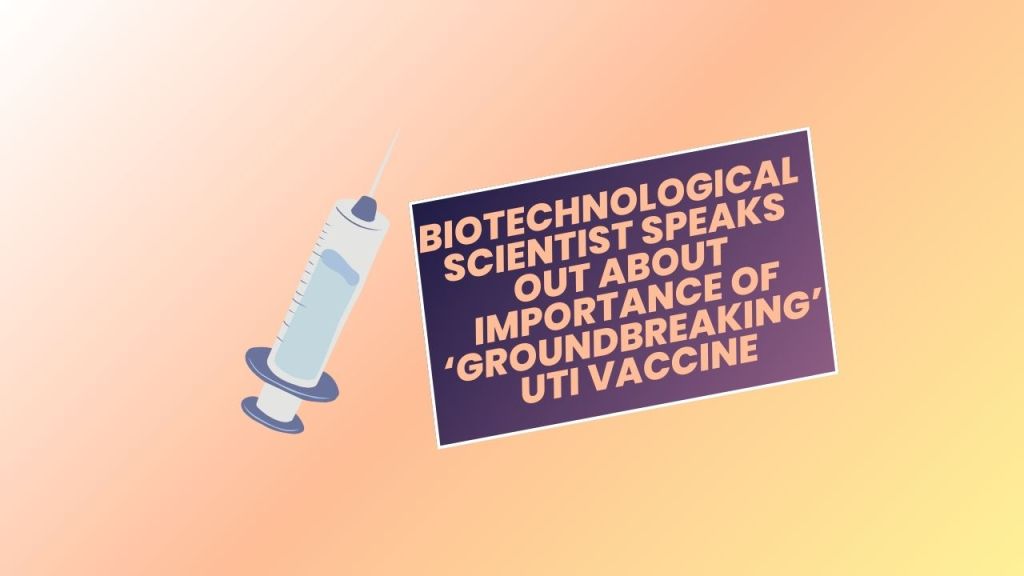Biotechnological Scientist Speaks Out About Importance Of ‘Groundbreaking’ UTI Vaccine
- Homelium

- Oct 29, 2024
- 3 min read
Updated: Jul 24, 2025

Urinary Tract Infections (UTIs) are a prevalent and distressing issue that afflicts millions of individuals globally, particularly the elderly.
Despite being commonly addressed with antibiotics, the escalating threat of antibiotic resistance presents a formidable obstacle to effectively managing UTIs, particularly among older populations.
Nevertheless, recent pioneering research has introduced a promising development in the battle against UTIs: a UTI vaccine that is aimed at tackling these infections altogether, as documented by Independant.
In this Homelium article, we speak to Biotechnologist and Pharmaceutical Scientist Chloe Lortal to explore the importance of this breakthrough and its prospective implications for public health.
How important do you think the UTI vaccine is?
"UTIs represent a substantial health concern, affecting approximately 400 million people each year, predominantly women, with at least half of all women experiencing a UTI in their lifetime.
The escalating resistance of antibiotics further compounds this issue. Given that antimicrobial resistance represents one of the biggest threats to global health in our lifetime, the pursuit of effective alternatives is imperative.
This vaccine not only addresses this pressing need but also serves as a beacon of hope for combating other bacterial infections, serving as a model for potential solutions."
How effective is the UTI vaccine in preventing urinary tract infections?
"This vaccine, known as Uromune, has demonstrated remarkable efficacy in preventing infections over a prolonged period.
During a nine-year follow-up, 54% of individuals remained free from UTIs, with the entire cohort experiencing an average UTI-free period of 4.5 years.
Uromune is composed of four types of inactivated whole bacteria commonly implicated in UTIs: Escherichia coli, Klebsiella pneumoniae, Proteus vulgaris, and Enterococcus Faecalis.
The effectiveness of this formulation is enhanced by the presence of a shared lipopolysaccharide outer layer among numerous gram-negative bacteria, potentially bolstering the broad-spectrum efficacy of the vaccine."
As the UTI vaccine has only recently been tested, do you believe people will be hesitant to receive such treatment?
"Unfortunately, vaccine hesitancy stands as one of the foremost challenges of our time, posing a significant threat to global health.
However, there are strategies to confront this issue, including ongoing clinical studies to add evidence, addressing misconceptions, and sharing information from reputable sources like the NHS and the WHO.
I am firmly convinced that individuals enduring recurrent UTIs will eagerly opt for this vaccine to enhance their quality of life.
Moreover, the vaccine is relatively non-invasive, administered as a sublingual formulation through two sprays of a pineapple-flavoured suspension under the tongue daily for three months, followed by a follow-up dose, rendering the process far from daunting."
"Vaccine hesitancy stands as one of the foremost challenges of our time, posing a significant threat to global health."
Do you truly believe the vaccine will positively impact those prone to UTI’s?
"I strongly believe that the vaccine will have a profoundly positive impact on individuals prone to UTIs.
Individuals suffering from UTIs - especially recurrent ones - endure significant challenges to both their mental and physical well-being.
They commonly report heightened risks of depression, stress, and anxiety, as well as sexual dysfunction and physical limitations, often necessitating time away from work and daily activities. Furthermore, the majority of women with recurrent UTIs suffer from short- and long-term adverse effects from antibiotics.
This vaccine represents a pivotal breakthrough for individuals with recurrent UTIs, with the results demonstrating considerable promise. It is imperative that the next steps involve advancing toward regulatory approval in the UK."
Do you believe the UTI vaccine will eventually replace other preventive measures for UTIs, such as antibiotics or cranberry supplements?
"The journey ahead for this vaccine to potentially supplant other preventive and treatment options for UTIs, such as antibiotics or cranberry supplements, remains lengthy.
Nonetheless, the hope is that it could result in fewer infections and decreased reliance on antibiotics, thereby mitigating the struggle against antibiotic resistance."
Do you believe there are any contraindications for receiving the UTI vaccine?
"There appear to be no contraindications for receiving the UTI vaccine, and overall, it is safe for long-term use.
No adverse effects or other concerns were identified during the clinical study."
"There appear to be no contraindications for receiving the UTI vaccine, and overall, it is safe for long-term use."
How long do you think it will be before we see a decrease in hospital admissions for UTIs thanks to the vaccine?
"First, the next step is for the results of this study to be looked at by the Medicines and Healthcare Products Regulatory Agency (MHRA) before the vaccine can be passed on for use on the NHS.
The approval process is likely to proceed gradually, with additional studies underway or planned to gather further evidence, particularly in more complex cases.
However, once the vaccine becomes accessible, I believe the rates of hospital admissions for UTIs thanks to the vaccine should decrease quickly - in a couple of years and hopefully less."




Comments